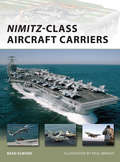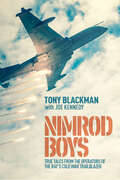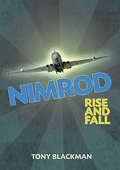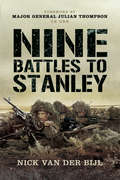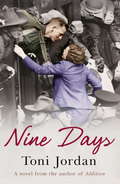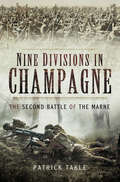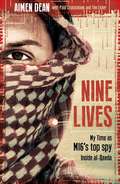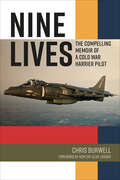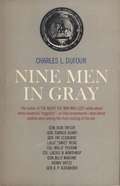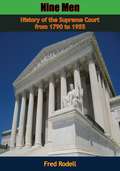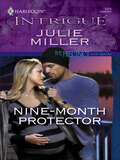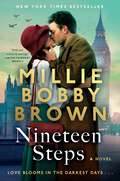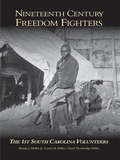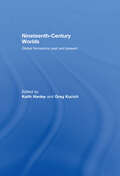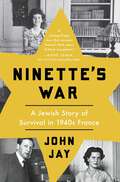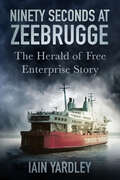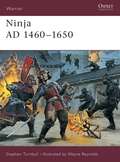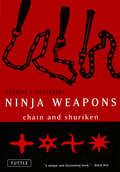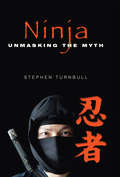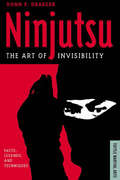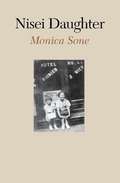- Table View
- List View
Nimitz-Class Aircraft Carriers
by Brad Elward Paul WrightThe Nimitz class aircraft carrier is the ultimate symbol of the United States superpower status. A true behemoth, this is an unsurpassed weapons platform that overshadows all of its nearest rivals. A history of the largest aircraft carriers in the world, with runways over 300 meters long, this book looks at the development and deployment of the nuclear-powered Nimitz class aircraft carriers from 1975 when the USS Nimitz, the lead ship of the class, was commissioned, to the present day.All of the class are still operational and the tenth and last of the class, the USS George H. W. Bush, was commissioned in 2009. Here, Brad Elward provides a detailed overview of their design and development, highlighting their unique features, from jet blast deflectors to cutting edge radar systems, and a history of the Nimitz class in service, from deployment in the Gulf during Operation Desert Storm, through to the enforcement of the no fly zone over Bosnia.From the Trade Paperback edition.
Nimo's War, Emma's War: Making Feminist Sense of the Iraq War
by Cynthia EnloeIn a book that once again blends her distinctive flair for capturing the texture of everyday life with shrewd political insights, Cynthia Enloe looks closely at the lives of eight ordinary women, four Iraqis and four Americans, during the Iraq War.
Nimrod Boys: True Tales from the Operators of the RAF’s Cold War Trailblazer (The\jet Age Ser. #14)
by Joe Kennedy Tony BlackmanNimrod Boys is a complementary book to Nimrod Rise and Fall from acclaimed author Tony Blackman. It is a collection of over twenty firsthand accounts of operating the Hawker Siddeley Nimrod – an aircraft which served at the forefront of the Cold War. As the first jet-powered maritime aircraft, it could reach critical points for rescues or for operational requirements in rapid time. Its outstanding navigation and electronics systems also allowed the Nimrod to be a first-class machine in antisubmarine warfare. The book focuses on the Nimrod’s UK-based and worldwide operations. With detailed accounts of the Nimrod’s role during the Falklands Campaign and in later conflicts such as the First Gulf War to modern-day anti-drug smuggling operations in the Caribbean. There are also descriptions of the Nimrod’s achievements in the International Fincastle Competition – where RAF squadrons competed against counterparts from Australia, Canada and New Zealand. With a variety of perspectives on Nimrod crew life, including from a female air electronic operator, readers will find dramatic, engaging and occasionally humorous stories. One flight test observer also reflects on the canceled Nimrod MR4 project. Nimrod Boys written by Tony Blackman with Joe Kennedy and with a foreword by AVM Andrew Roberts is more than worthy addition to the celebrated Boys series.
Nimrod Rise and Fall: Rise And Fall
by Tony BlackmanThe episodic history of Britain&’s infamous military reconnaissance aircraft, by the author of Vulcan Test Pilot and aviation expert who witnessed it all. The scrapping of the Nimrod program has been one of the most controversial events in the military aviation world for many years. For most of its operational life, from 1969 to date, its contribution to the defense of the realm and its role in offensive duties was, of necessity, often shrouded in secrecy. It was the &“eye in the sky&” that was vital to a host of activities—from anti-submarine and anti-surface warfare, to support of land battles throughout the world, to the Falklands campaign, to combating drug-running. Now the UK is bereft of such a multitasking reconnaissance aircraft. The full story of the Nimrod, and its significance, has now been told. Tony Blackman, who was there at the beginning, test-flew nearly every aircraft, and was at Kinloss on the very day the project was canceled, has written this timely book, covering every facet of its history, its weapons system developments, and its tragic accidents. He writes in an approachable way, making technical subjects understandable, but his conclusions will, inevitably, not be welcomed by everyone.
Nine Battles to Stanley
by Nicholas van der BijlNine Battles to Stanley is a soldiers account of the ground fighting on South Georgia and the Falklands.What makes this book unique is the fascinating and objective way the author describes the experiences, view points and comparative qualities of both sides to the conflict. Fresh light is shed on the whole campaign even the best known battles at Goose Green (where Col. H. Jones won his VC) and the night attack on Mount Tumbledown.
Nine Days: A deeply moving and beautiful story set during the Second World War
by Toni Jordan'The suspense is frequently nail-biting . . . beautifully constructed.' Daily Mail'A sweet, charming, witty, romantic book,' BBC Radio 2, The WeekenderThe tiniest things - a coin, a pendant, a photograph, a lie - can make or ruin lives. It is 1939. Deep in the working-class Melbourne suburb of Richmond Kip Westaway, failed scholar and stablehand, is about to live through the most important day in his young life as Australia hovers unknowingly on the brink of war. What happens that day is the catalyst for momentous events strung across eight more moments in time; love and deception, near-misses and misunderstandings, all centred around the terrible thing that happens to a young girl and the repercussions it will have on the lives of her family, even those not yet born.. Toni Jordan's NINE DAYS is a beautiful, heartbreaking novel, a masterful piece of writing filled to bursting with warm, funny, spiky, lovable characters. It is the story of a tragedy, and the ripples that spread outwards from it through the generations, for better or worse. It is a book you will want to pass on, if you can bear to let it go.
Nine Divisions in Champagne: The Second Battle of Marne
by Patrick TakleThe book explains how the Allies, after a series of swingeing defeats, sank their differences and came together to turn the tide against the German Army in the Summer of 1918. Although it is a detailed history of the fighting by British divisions, it also highlights the growing presence of American forces and their huge contribution to victory, too often understated in earlier works. The book deliberately binds together the genesis, size and equipment of the British and American divisions and seeks to inter-mingle the American and British campaigns of 1918.By blocking the Third German Offensive on the Chemins des Dames and then arriving in time to turn the Kaiser's army out of the Marne salient, the Allied divisions cleared the way for the decisive counter offensive at Amiens. Exhausted and demoralized, the German Army collapsed and the outcome of The Great War was decided.
Nine Lives: My Time As MI6's Top Spy Inside al-Qaeda
by Paul Cruickshank Tim Lister Aimen DeanAs one of al-Qaeda&’s most respected bomb-makers, Aimen Dean rubbed shoulders with the mastermind of the 9/11 attacks and swore allegiance to Osama bin Laden. As a double agent at the heart of al-Qaeda&’s chemical weapons programme, he foiled attacks on civilians and saved countless lives, brushing with death so often that his handlers began to call him their spy with nine lives. This is the story of how a young Muslim, determined to defend his faith, found himself fighting on the wrong side – and his fateful decision to work undercover for his sworn enemy. From the killing fields of Bosnia to the training camps of Afghanistan, from running money and equipment in Britain to dodging barrel bombs in Syria, we discover what life is like inside the global jihad, and what it will take to stop it once and for all.
Nine Lives: The Compelling Memoir of a Cold War Harrier Pilot
by Chris BurwellChris Burwell charts one man’s career in aviation from joining the RAF in 1969 aged 18, to having responsibility for training pilots for the world’s major airlines nearly 50 years later. After training at RAF Cranwell and RAF Valley and a tour as a flying instructor on Jet Provosts, he joined the Harrier Force, flying on front-line squadrons in the UK and Germany during the Cold War and as an instructor on the Harrier Conversion Unit. Detachments to Belize in 1977, the Falklands (twice), ejection from a Harrier GR3, introducing FLIR and NVG to the Harrier front line and operational missions in Northern Iraq are all covered in entertaining detail. After 30 years of service, the author spent 12 years with Cobham, managing their Teesside base and flying the Falcon 20 on operational training for the military and the King Air 200 on international flight calibration tasks. Finally, he spent four years in Spain with Flight Training Europe (FTE) Jerez with responsibility for the flying training of a new generation of pilots. Through his experience as a pilot, leader and manager gained over many years, his valuable insights into military and civilian flying operations are both engrossing and noteworthy. Highly recommended to readers of both disciplines.
Nine Men In Gray
by Charles L. DufourIn this volume of biographical essays, all vividly written, extensively researched, Charles L. Dufour recounts the lives of nine Confederate officers, who served their cause with dedication, skill and bravery."Porter Alexander is not a household name today, but he should be remembered as one of Robert E. Lee's most valuable officers. Bold and imaginative, Alexander was an artillerist whose service was requested by every Confederate army commander. He and eight other "men in gray" come to life in vivid sketches by Charles L. Dufour. Singled out are Dick Taylor, the handsome son of former president Zachary Taylor who led the Louisiana Brigade; Turner Ashby, an expert horseman whose death in battle typified the doomed gallantry of the Rebels; Pat Cleburne of the Army of Tennessee, who was called "the Stonewall of the West"; "Savez" Read, a navy man who terrorized the Atlantic seaboard in a one-gun sailing vessel; Willie Pegram, a shy Virginian who was a bold cannoneer; Lucius B. Northrop, whose abrasive personality complicated his task of feeding the army; William Mahone, whose ferocious fighting spirit belied his bantam size; and Henry Hotze, who served brilliantly as a Confederate agent and propagandist."-Print ed.
Nine Men: Political History of the Supreme Court from 1790 to 1955
by Fred RodellThis book, first published in 1955, analyzes the Supreme Court decisions that were made between the years 1790 up to and including 1955.The author, a Yale University Professor of Law, appraises the Supreme Court and its place in the United States’ scheme of government, which is seen to treat the Justices not as law-givers, but as men whose motivations are the direct result of their own political beliefs and personal backgrounds.A fascinating read.
Nine-Month Protector (The Precinct: Vice Squad #2)
by Julie MillerMorning sickness used to be Sarah Cartwright's biggestproblem-until she became the only witness to a murder. Now, newly pregnant, she had a killer on her trail-andCooper Bellamy, KCPD's finest, by her side. Her brother'sbest friend and her sworn protector, it was impossible tokeep Coop at arm's length. Yet the mother-to-be discoveredthe safest place to hide was in his strong arms. They foundout soon enough they each needed the other-but would itbe too late before a cold-blooded hit man made them takevows of permanent silence?
Nineteen Steps
by Millie Bobby BrownThe New York Times bestseller from iconic Emmy-nominated actress and producer MILLIE BOBBY BROWN: Nineteen Steps "My inner history-loving teenage geek clapped her hands in ecstasy at the thought of a historical novel penned by Enola Holmes, and she wasn't disappointed!”—Kate QuinnLove blooms in the darkest days…It’s 1942, and air raid sirens continue to wail around London. Eighteen-year-old Nellie Morris counts every day lucky that she emerges from the underground shelters unharmed, her loving family still surrounding her.After a chance encounter with Ray, an American airman stationed nearby, Nellie becomes enchanted with the idea of a broader world. Just when Nellie begins to embrace an exciting new life with Ray, a terrible incident occurs during an air raid one evening, tearing Nellie’s world apart. But just when it seems all hope is lost, Nellie finds that, against all odds, love and happiness can triumph.Nineteen Steps is a deeply affecting, mesmerizing page-turner inspired by the author’s family history. An epic story of longing, loss, and secrets, Millie Bobby Brown’s propulsive debut introduces an unforgettable, brave young woman and boldly portrays the strength in the power of love.“Inspired by my Nanny Ruth, this book is very personal and close to my heart. I grew up listening to stories about her time living through the war. I’m honored to keep her story alive.”—Millie Bobby Brown
Nineteenth Century Freedom Fighters: The 1st South Carolina Volunteers
by Curtis M. Miller Cheryl Trowbridge-Miller Bennie J McRae Jr.This Civil War regimental history vividly chronicles the Union Army&’s first black unit through the personal writings of its commanding officer. The 1st South Carolina Volunteers, later the 33rd United States Colored Troops, were the first black unit of the Civil War. Beginning a year before the 54th Massachusetts—the unit immortalized in the film Glory—the 1st South Carolina was comprised of men who had escaped slavery to fight for the freedom of all. Known for their courage, discipline, and pride, they continued to serve the Union cause even while their regiment was temporarily disbanded. The 1st South Carolina Volunteers fought for years with little or no pay, poor equipment, and constant pressure and abuse from both North and South. In this brief volume, historian Curtis M. Miller presents a vivid chronicle of these unsung heroes, largely culled from the letters and journals of their commanding officer, Lt. Col. Charles T. Trowbridge.
Nineteenth-Century Worlds: Global formations past and present
by Keith Hanley Greg KucichThis volume assembles a wide range of studies that together provide—through their interdisciplinary range, international scope, and historical emphases—an original scholarly exploration of one of the most important topics in recent nineteenth-century studies: the emergence in the nineteenth century of forms of global experience that have developed more recently into rapidly expanding processes of globalization and their attendant collisions of race, religion, ethnicity, population groups, natural environments, national will and power. Emphasizing such links between global networks past and present, the essays in this volume engage with the latest work in postcolonial, cosmopolitan, and globalization theory while speaking directly to the most pressing concerns of contemporary geopolitics. Each essay examines specific cultural and historical circumstances in the formation of nineteenth-century worlds from a range of disciplinary perspectives, including economics, political history, natural history, philosophy, the history of medicine and disease, religious studies, literary criticism, art history, and colonial studies. Detailed in their particular modes of analysis yet integrated into a collective conversation about the nineteenth century’s profound impact on our present worlds, these inquiries also explore the economic, political, and cultural determinants on nineteenth-century types of transnational experience as interweaving forces creating new material frameworks and conceptual models for comprehending major human categories—such as race, gender, subjectivity, and national identity—in global terms. As nineteenth-century global intersections differ in important ways from the shapes of globalization today, however, the essays in this volume generate new ways of understanding emergent patterns of worldwide experience in the age of imperialism and thereby stimulate fresh insights into the dynamics of global formations and conflicts today.
Ninette's War: A Jewish Story of Survival in 1940s France
by John JayThe moving, poignant true story of a young Jewish girl coming of age in France during World War II, as the Holocaust approaches.This is the heart-wrenching true story of a young Jewish girl coming of age in France during World War II. Ninette Dreyfus belonged to one of the most influential Jewish families in Paris—second only to the Rothschilds—her parents&’ social circle ranging from Einstein to Colette. But all that privilege counted for nothing when the Nazis arrived; the family was high up on the list of Philippe Petain&’s targets. Inspired by diary entries and by conversations the author had with Ninette before she died, Ninette's War narrates the family's fall from grace alongside the creeping understanding of the Vichy government&’s collaboration with the Nazis. Through Ninette&’s eyes we witness how it all unfolded: from the anti-Semitism in the playground—sometimes from her own teachers—to Ninette&’s first crush under a false identity. Woven into the political backdrop of a nation turning inward on itself, this is the tale of a life once filled with riches becoming rootless, where friends were left behind and politicians legislated their own people out of existence—and to their deaths—culminating in what we now know as the Holocaust.
Ninety Seconds at Zeebrugge: The Herald of Free Enterprise Story
by Iain YardleyThe Herald of Free Enterprise car ferry set sail on a routine voyage to Dover in March 1987, carrying hundreds of passengers, including British army personnel, day-trippers and truck drivers. Minutes after leaving the Belgian port of Zeebrugge, the ferry began to capsize. Terrified passengers were separated from loved ones in a seething mass of humanity, in freezing cold water and had to fight for their lives. This is the minute-by-minute account of those who lived through the disaster, from the event to rescue, reunion and repatriation. The Belgian people are also remembered for the care and comfort they gave to the bewildered and grief-stricken survivors. Including plans, photographs and records considering how this disaster impacted ferry operating procedures forever, Iain Yardley’s thoughtful study covers every aspect of this tragedy. Many survivors, relatives and rescue workers have contributed to make this a fitting tribute to all involved from that night to the present day.
Ninja AD 1460-1650
by Stephen Turnbull Wayne ReynoldsThe Ninja were the secret agents and assassins of feudal Japan and they remain a subject of enduring fascination. They first emerged during the power struggles of 9th and 10th century Japan, in response to the increasing demand for spies, informants and even assassins, and they were used until the mid-1600s when they disappeared on account of a campaign to destroy them. This title provides an accurate and detailed account of the reality of the Ninja, detailing their daily life, training, hiring, combat use and secret operations; also covered are the Ninja's use and knowledge of poisons, medicines and charms.
Ninja Weapons
by Charles V. GruzanskiThis handy volume introduces the exciting and deadly secrets of two ninja arts- the chain and the shuriken. The Masaki school of chain fighting was developed in the feudal society of the early eighteenth century by a swordsman-sentry in Edo (Tokyo) Castle. Feeling that the shedding of blood in such a hallowed place would be disgraceful, he devised the combat use of the weighted chain . Even the name he gave to the art proves the trust he placed in its effectiveness- manrikigusari (chain with the power of ten thousand). The equally devastating art of shuriken, the throwing of metal stars and spikes, evolved shortly after manrikigusari. The easily concealed shuriken soon became known as an extremely effectiveweapon for both ninja and samurai warriors.
Ninja Weapons
by Charles V. GruzanskiThis handy volume introduces the exciting and deadly secrets of two ninja arts- the chain and the shuriken. The Masaki school of chain fighting was developed in the feudal society of the early eighteenth century by a swordsman-sentry in Edo (Tokyo) Castle. Feeling that the shedding of blood in such a hallowed place would be disgraceful, he devised the combat use of the weighted chain . Even the name he gave to the art proves the trust he placed in its effectiveness- manrikigusari (chain with the power of ten thousand). The equally devastating art of shuriken, the throwing of metal stars and spikes, evolved shortly after manrikigusari. The easily concealed shuriken soon became known as an extremely effectiveweapon for both ninja and samurai warriors.
Ninja Weapons
by Charles V. GruzanskiThis handy martial arts book, Ninja Weapons introduces the exciting and deadly secrets of two ninja arts--the chain and the shuriken.The Masaki school of chain fighting was developed in the feudal society of the early eighteenth century by a swordsman-sentry in Edo (Tokyo) Castle. Feeling that the shedding of blood in such a hallowed place would be disgraceful, he devised the combat use of the weighted chain. Even the name he gave to the art proves the trust he placed in its effectiveness--manrikigusari (chain with the power of ten thousand).The equally devastating art of shuriken, the throwing of metal stars and spikes, evolved shortly after manrikigusari. The easily concealed shuriken soon became known as an extremely effective weapon for both ninja and samurai warriors. Included are "The Samurai Creed," various techniques, the history of the arts and over 100 black and white photos and illustrations.
Ninja Weapons
by Charles V. GruzanskiThis handy martial arts book, Ninja Weapons introduces the exciting and deadly secrets of two ninja arts--the chain and the shuriken.The Masaki school of chain fighting was developed in the feudal society of the early eighteenth century by a swordsman-sentry in Edo (Tokyo) Castle. Feeling that the shedding of blood in such a hallowed place would be disgraceful, he devised the combat use of the weighted chain. Even the name he gave to the art proves the trust he placed in its effectiveness--manrikigusari (chain with the power of ten thousand).The equally devastating art of shuriken, the throwing of metal stars and spikes, evolved shortly after manrikigusari. The easily concealed shuriken soon became known as an extremely effective weapon for both ninja and samurai warriors. Included are "The Samurai Creed," various techniques, the history of the arts and over 100 black and white photos and illustrations.
Ninja: Unmasking the Myth
by Stephen TurnbullThis history of the ninja uncovers the truth behind the image—from the exploits of medieval ninjas to their modern incarnation as pop culture icons. The ninja is a legendary figure in Japanese military culture, a fighter widely regarded as the world&’s greatest expert in secret warfare. The word alone conjures the image of a masked assassin dressed in black, capable of extraordinary feats of daring; a mercenary who disposes of enemies by sending sharp iron stars spinning towards them. This is, of course, a popular myth, based on exaggerations and Hollywood movies. But the truth, as Stephen Turnbull explains in Ninja, is even more fascinating. A leading expert on samurai culture, Turnbull presents an authoritative study of ninja history based on original Japanese sources, many of which have never been translated before. These include accounts of castle attacks, assassinations and espionage, as well as the last great ninja manual, which reveals the spiritual and religious ideals that were believed to lie behind the ninja&’s arts. Turnbull&’s critical examination of the ninja phenomenon ranges from undercover operations during the age of Japan&’s civil wars to the modern emergence of the superman ninja as a comic book character. The book concludes with a detailed investigation of the ninja in popular culture.
Ninjutsu The Art of Invisibility
by Donn F. DraegerNinja-the very word inspires awe and terror in equal measure. Master of espionage and assassination, stealth and concealment, the ninja's ability to move swiftly and silently gave rise to popular legends of amazing exploits, invincibility and supernatural powers.In Ninjutsu: The Art of Invisibility, Donn Draeger draws back the veil of mystery shrouding the arcane practices of feudal Japan's shadow warriors. Stripping away myth and exaggeration, Draeger reveals the secret tactics, exotic weapons, tricks and disguises that earned the ninja a reputation as history's most feared secret agents.
Nisei Daughter
by Monica Itoi SoneMonica Sone grew up struggling with her identity in a part-American, part-Japanese world. Her memoir describes pre-war Seattle and the conflict she experienced between her two sides.
